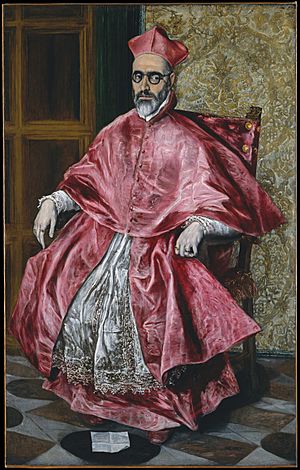Fernando Niño de Guevara facts for kids
Quick facts for kids His Eminence Fernando Niño de Guevara |
|
|---|---|
| Cardinal Archbishop of Seville Cardinal-priest of Santi Silvestro e Martino ai Monti |
|

|
|
| Archdiocese | Seville |
| See | Seville |
| Enthroned | 30 April 1601 |
| Reign ended | 8 January 1609 |
| Predecessor | Rodrigo de Castro Osorio |
| Successor | Pedro de Castro y Quiñones |
| Other posts | Cardinal-priest of Santi Silvestro e Martino ai Monti |
| Orders | |
| Consecration | 10 October 1599 by Pope Clement VIII |
| Created Cardinal | 5 June 1596 |
| Rank | Cardinal-priest |
| Personal details | |
| Born | 1541 Toledo, Spain |
| Died | 8 January 1609 (aged 68) Seville, Spain |
| Nationality | Spanish |
| Denomination | Roman Catholic |
| Occupation | Lawyer |
| Previous post | Cardinal-priest of San Biagio dell'Anello (1597-1599) Titular archbishop of Philippi (1599-1601) Grand Inquisitor of Spain (1600-1602) |
| Alma mater | University of Salamanca |
Fernando Niño de Guevara (1541 – 8 January 1609) was an important Spanish cardinal. He also served as the Archbishop of Seville and the Grand Inquisitor of Spain.
Contents
Life and Career
Early Life and Education
Fernando Niño de Guevara was born in Toledo, Spain, in 1541. His father was Rodrigo Niño, who was the Marquis of Tejares. Fernando had an uncle, also named Fernando Niño de Guevara, who was an archbishop.
Fernando studied law at the University of Salamanca. After his studies, he moved to Cuenca, Spain. There, he became an important church official at the cathedral. In 1570, he became an oidor in Valladolid. An oidor was a judge in a high court. In 1580, he joined the Council of Castile. This was a very important government group in Spain.
Becoming a Cardinal and Archbishop
Fernando Niño de Guevara became a cardinal on June 5, 1596. This was a high rank in the Catholic Church. Pope Clement VIII made him a cardinal.
On October 10, 1599, he was made a bishop by Pope Clement VIII. Two other important church leaders, Camillo Borghese and Alfonso Visconti, helped with the ceremony.
In 1601, Fernando Niño de Guevara was also appointed Archbishop of Seville. This meant he was the main bishop for the city of Seville and its surrounding area.
Role as Grand Inquisitor
On December 3, 1599, Fernando Niño de Guevara was given a very powerful job. He became the Grand Inquisitor of Spain. This role meant he led the Spanish Inquisition. The Inquisition was a special church court. It investigated people who were accused of not following the Catholic faith.
During his time as Grand Inquisitor, the Inquisition investigated many people. Some individuals were found guilty and received different punishments.
Disputes and Later Life
Fernando Niño de Guevara had a disagreement with the Jesuits. This was about how much power the Pope should have. Because of this dispute, Pope Clement VIII asked Philip III of Spain to have Fernando resign from his role as Grand Inquisitor. He resigned in 1602.
However, he continued to serve as the Archbishop of Seville. In 1604, he called a special meeting called a synod. At this meeting, he tried to change how certain religious groups, called confraternities, worked. He wanted them to be more controlled by church leaders.
Fernando Niño de Guevara passed away on January 8, 1609. He was likely in Seville at the time. He is buried in the Convent of San Pablo in Toledo.
His Portrait by El Greco
In 1600, a famous artist named El Greco painted a portrait of him. This painting is now very well known.
Bishops He Consecrated
As a bishop, Fernando Niño de Guevara helped to make other men bishops. He was the main person to consecrate, or officially appoint, these bishops:
- Tomás de Borja, who became the Bishop of Malaga in 1600.
- Juan Bautista Acevedo Muñoz, who became the Bishop of Valladolid in 1601.
- Juan de la Sal, who became an Auxiliary Bishop of Seville in 1603.
- Francisco de Vera-Villavicencio, who also became an Auxiliary Bishop of Seville in 1603.
See also
 In Spanish: Fernando Niño de Guevara para niños
In Spanish: Fernando Niño de Guevara para niños
 | Ernest Everett Just |
 | Mary Jackson |
 | Emmett Chappelle |
 | Marie Maynard Daly |

